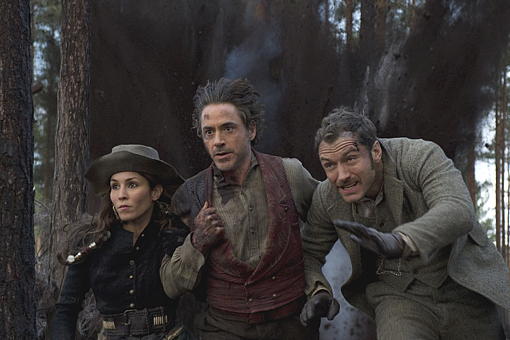By Brock Wilbur · December 19, 2011

Sherlock Holmes is either the least capable detective on the planet, or the greatest. He can stop time, envision the future, and out MacGuyver… that guy. He also drinks embalming fluid, treats his enemies with greater respect than his friends, and comes off as a poster boy for Aspergers'.
Robert Downey Jr. is either the least capable actor on the planet, or the greatest. Ninety percent of his roles ask him to play Robert Downey Jr., and while he's fantastic at that, it is often difficult to judge if that strength comes from the skill of acting or just our insatiable desire to watch RDJ2 be cool and pretend we're hanging out with him (see also: Iron Man). The Holmes franchise asks, at minimum, that he apply several extra degrees of mania and an accent, then gives him no upper limit. The result is some of the finest work in his career, and this sequel to Sherlock Holmes (2009) builds upon a successful franchise with a much more developed film.
The original offering was a glorious mish-mash of character choices, elaborate set-pieces, and bromance. Its greatest flaw was in the consistent undermining of its primary villain, by reminding us that Lord Blackwood was merely a pawn in a larger scheme run by the mysterious Moriarty. This wasn't just a cliffhanger ending; this was a sizable section of the narrative from the mid-point onward, which positioned the film so wholly in a support position to its sequel, it felt comparable to Back to the Future 2, which cuts off suddenly to show the trailer for the third film. It was still an excellent tent-pole action feature, but dedicating portions of your plot to setting high expectations for a follow-up can have disastrous consequences.
Game of Shadows picks up immediately following the events of the original, with Irene Adler (Rachel McAdams) still in Mortiarty's employ and Dr. Watson (Jude Law) preparing for his wedding. After a near assassination, Adler finally meets with Dr. Moriarty (Jared Harris), who decides he no longer requires her services. Holmes throws a bachelor party for Watson, which is merely a cover for him to interrogate a gypsy fortune-teller, Madame Simza Heron (Noomi Rapace), whose brother may have become the vital cog in Moriarty's devious plan. Following a face to face between the Doctor and Holmes, where their formal declarations of war are traded, the game begins.
The scope of Moriarty's vision is worldwide, each element playing out on a very personal level, beginning with an attack on Watson and his new bride. The film spares no one, and the brutality of Moriarty's moves carry grave emotional weight. It's a vastly darker film than the original, and makes daring choices throughout. Holmes is rarely the victor in any scenario, and even the minor victories are off-set by larger devastation elsewhere. While the plot borrows heavily from my favorite of all the Doyle story-lines ("The Final Problem"), it also dabbles in elements of The League of Extraordinary Gentlemen and Watchmen. The twists often lack the surprise of the original film, but the excellent delivery more than makes up for it. I could watch a half-dozen more sequels in which Robert Downey Jr. and Jared Harris play chess against each other. Literally or figuratively. The last act of the film includes some of the smartest filmmaking of the year, including a penultimate confrontation that pits the Turing test against the human condition.
As always, director Guy Ritchie's stylish cinematic swagger is on full display. There's not an establishing shot that doesn't immediately convey "Oh, that's totally going to blow up later", but the giant CGI explosion sandbox is never half as impressive as Holmes taking down a group of street thugs or a lone assassin. Ritchie makes every attempt to bring that same level of intensity and speed to even the smaller moments. Holmes rarely performs any detecting in this film without being shot at, having some invisible doom clock counting down, or a combination of both. Ritchie also gets to play with his love of gypsy culture again, and that's a win for all of us.
The great disappointment in Game of Shadows is the missed opportunity. The producers announced that they would be pursuing a homosexual relationship between Holmes and Watson, the natural evolution of the bromance, and a tension clearly visible in the original Doyle texts. The Doyle estate responded by letting them know no such choice would be made, and thusly we find Noomi Rapace in the film. Doing nothing. The idea of a gay couple starring in a blockbuster action film, especially one already built upon their mutual love, was so groundbreaking, progressive, and (more than anything else) original. 'Tis shameful to have that taken away. Luckily, the writers seemed to not get this memo, as every exchange between Watson and Holmes carries so much care mixed with relationship in-fighting, you're left feeling like the only scene cut from the film was of a final kiss between the two. They literally waltz together. I'm sure the Doyle estate loved that bit.
In it's two-hour run-time, there is little pure popcorn-joy to be had. This is a darker vision. Victory eludes Holmes at every turn, which while not pleasant, proves Moriarty as the worthy adversary who lives up to his villainous literary legacy. The sight gags and pithy rejoinders of the original have been buried in favor of a man falling apart at the seams, trapped in visceral warfare with a world he's trying to save. It's a mature film disguised as another RDJ action comedy, and I'm not sure audiences will know what to make of it. The set pieces are still awe inspiring, but chess pieces in slight movements are what you'll remember.